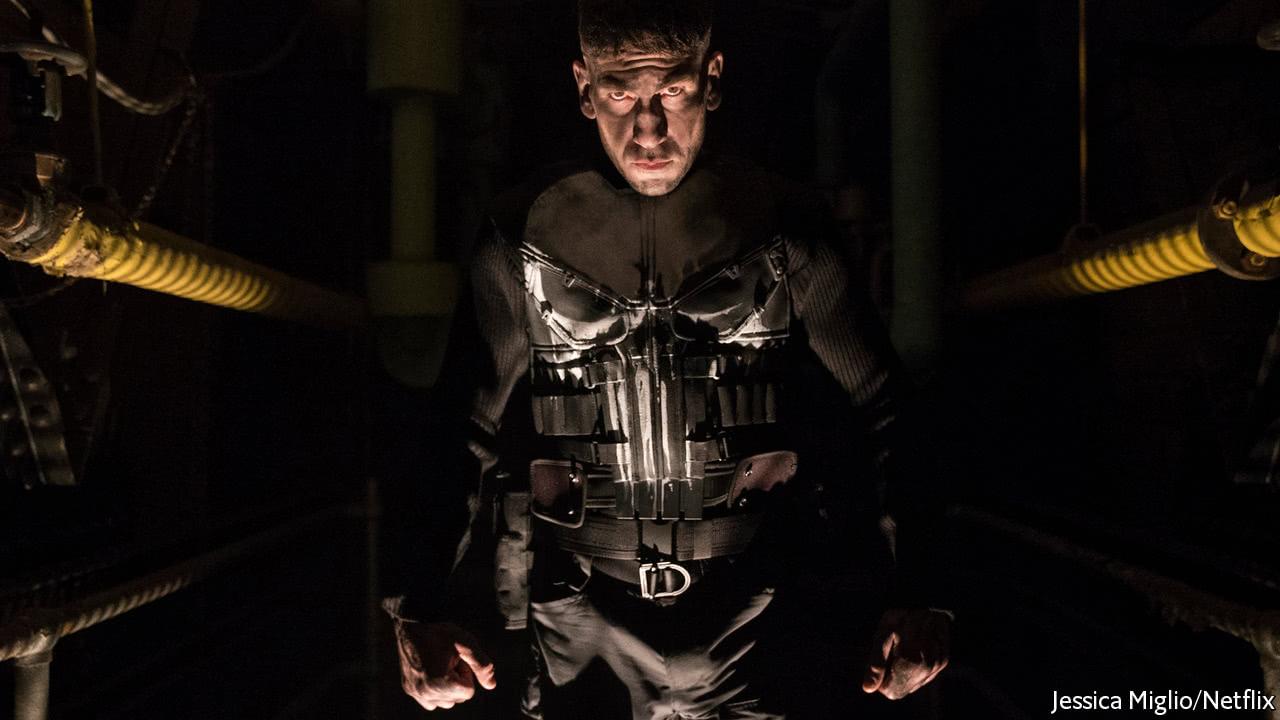A revenger’s tragedy“The Punisher” is a bloody, thoughtful addition to the Marvel canon
The Netflix series deals with weighty topics, but it can ignore some pressing existential issues

REVENGE is one of the oldest plot devices in history. Nemesis, an ancient Greek goddess, dealt in retributive justice; it is at the heart of Shakespeare’s “Hamlet” and “Titus Andronicus”, as well as westerns and films as diverse as “Gladiator” and “Death Wish”. And revenge is the primary motivation of Frank Castle—aka The Punisher—a Marvel character who has inspired three Hollywood movies and is the subject of a recent Netflix series.
One of the clever tropes of the Marvel film franchise has been the ability to interlink the plots; the recent reboot of “Spider-Man” benefited from a cameo appearance by Robert Downey Jr as Iron Man, for example. The studio is trying the same thing with its television series: the heroes of “Daredevil”, “Jessica Jones”, “Luke Cage” and “Iron Fist” teamed up as “The Defenders” earlier this year. The Punisher already appeared as the best element of the second series of “Daredevil”, where his back story (his family was killed by gangsters) is first explained. Alas, after a strong first series, Daredevil's second effort was mired in a plot involving mystical mumbo-jumbo and hordes of disposable ninjas (sadly this theme bogged down “The Defenders” as well).
Latest updates
“The Punisher” is a bloody, thoughtful addition to the Marvel canon
Greta Gerwig’s charming solo directorial debut
Is the Supreme Court softening on Donald Trump’s travel ban?
How America’s cities are competing for Amazon’s headquarters
Analysing Juan Orlando Hernández’s disputed election victory in Honduras
Childhood surroundings matter more than genes for would-be inventors
Thankfully, “The Punisher” stays much closer to the real world, or as close to the real world as a comic book series can be. It begins with Frank Castle finally wiping out the last of the gangsters while still haunted by the failure to protect his loved ones. It turns out his tragedy has deeper roots, dating back to his time as a Special Forces operative in Afghanistan. Dragged into the saga are Billy Russo (Castle’s best friend), a ruthless CIA official, a computer hacker, a beautiful Iranian-American officer in homeland security and Karen Page, a character from the “Daredevil” series.
The acting is good. Marvel has been able to recruit the likes of Sigourney Weaver and Scott Glenn in past series, and Jon Bernthal (best known as Shane in “The Walking Dead”) is excellent as The Punisher, conveying the grief and intensity of the character and even managing the occasional light moment. The series centres on the issue of post-traumatic stress disorder among veterans, with Castle far from the only example.
But the programme can only be recommended to those with strong stomachs. It is consistently violent: one episode consists almost entirely of The Punisher being tortured (intercut with some soft porn scenes as the character recalls sex with his wife). Another episode sees a villain’s face repeatedly pushed into a broken mirror. While the Punisher’s pursuit of revenge seems never-ending, the Godfather series was far more effective at illustrating the ultimate futility of the “eye for an eye” philosophy.
At a time when America seems dogged by mass shootings, making a hero out of a gun-toting character is problematic. The ethics of gun laws are discussed, but the dice are loaded by making the liberal-leaning character a coward. The Punisher has a code of honour and is only aiming to kill “bad guys”, but he still polishes off quite a lot of people who probably thought (as he did in Afghanistan) that they were only serving their country. Those foot soldiers will have families too.